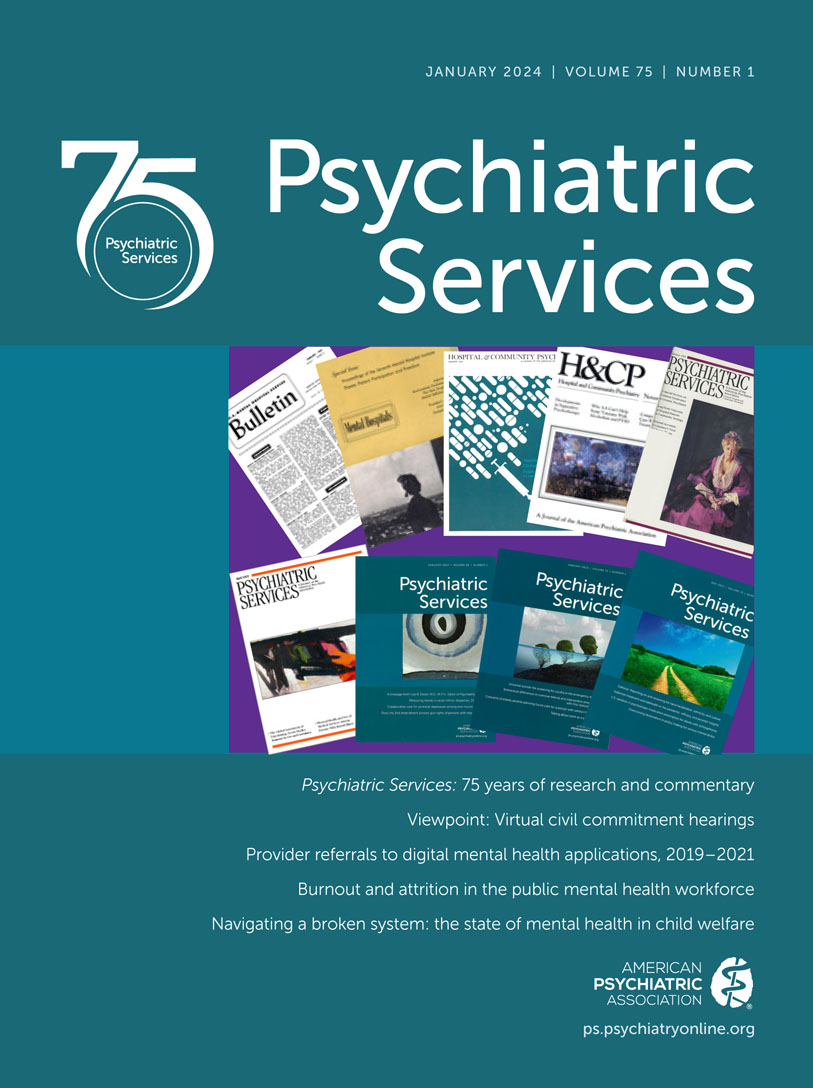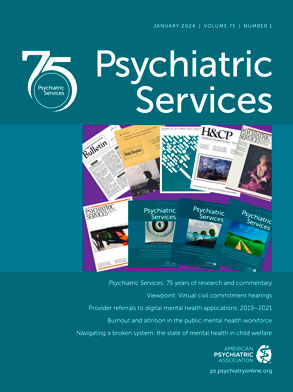We write this Taking Issue as editors of Psychiatric Services for 54 of its 75 years and as colleagues, all having been together at the University of Maryland School of Medicine for some of that time. We reflect on how the journal has changed over its 75-year course and how it has remained true to its focus on psychiatric services in organized care settings with a special concern for service users with the greatest needs.
The journal’s genesis was in 1950 as a four-page newsletter, A.P.A. Mental Hospital Service Bulletin, for administrators of mental health state hospitals. The world of behavioral health services has changed dramatically since the founding of the journal in 1951, when it was called Mental Hospitals. In 1966 the journal title was changed to Hospital & Community Psychiatry (H&CP), reflecting the dramatic expansion of services beyond hospitals and into community settings. In 1995 the journal became Psychiatric Services, signifying its reach beyond traditional services and service settings. Through all that change, the journal continued to focus on improving the care and treatment of those who are most in need—people with behavioral health conditions that diminish quality of life and people who may have substantial need and who experience significant barriers to receiving care.
Dr. Talbott had been the author of several papers published in and a member of the editorial board of H&CP when deputy medical director of the APA, Donald Hammersley, offered him the position of editor. A friendly critic questioned whether Dr. Talbott could reconcile the tradition of publishing articles that were concerned with the nuts and bolts of services with his academic orientation. He answered that he hoped it was possible to treat subjects, such as the treatment of individuals with severe and chronic mental illnesses, in an academically rigorous manner. During his almost 25 years of service, he encouraged rigorous submissions about care, especially of people with severe mental illness, and he introduced columns on areas such as the law and psychiatry, economics, and the DSM, which informed readers working in care settings.
Dr. Goldman became editor in 2004. He had coauthored the lead article in Dr. Talbott’s first issue. The article tackled how to define and count the number of people with severe and persistent mental disorders, the main focus of H&CP at the time. During his tenure, Dr. Goldman added a focus on public attitudes toward mental illness, delivery of mental health services in primary care, services for children with mental health problems, and services for the treatment of substance-related conditions. And he encouraged papers on behavioral health policy, particularly on financing of services and health insurance. He also edited an issue dedicated to the many writings of his predecessor, Dr. Talbott. To acknowledge the fifth anniversary of the attacks of September 11, 2001, he oversaw an issue on Project Liberty: New York City’s response to the mental health impacts of that tragedy. Throughout his tenure, Dr. Goldman strove to achieve a balance between rigorous empirical research and descriptive reports on early innovations in psychiatric services.
Dr. Dixon took over the editorship in 2017 after years of publishing papers in Psychiatric Services. Throughout its iterations, the journal had always been her favorite. The journal’s perspective resonated with her priorities as a person receiving services, a family member, a psychiatrist, and a researcher. Recent global events have affected Psychiatric Services as a journal. The public now appreciates that mental health services are a key component of a national health care system and social safety net. The pain, loss, and disruption of the COVID-19 pandemic demanded attention. So did the imperative to address how structural racism has been embedded in psychiatry and its scholarship. We wanted the journal to reflect our belief in the centrality of the social determinants of health to mental health. In response, Dr. Dixon has developed additional columns and facilitated person-level participation in their leadership. She has engaged people from the full range of mental health professionals, reaching beyond the profession of psychiatry. This intentionally includes the contributions of those who are early in their careers. The journal has implemented a Race/Racialization, Ethnicity, and Culture (REC) checklist to hold authors and reviewers—and ultimately editors—accountable for considering diversity, equity, and inclusion (DEI) issues in work being submitted and for future submissions. Our collective hope is that the journal continues to follow this journey of scholarship and education to improve psychiatric care for all who need it and to avoid its use for those who do not.
More than ever, the journal is about service users and DEI and improving the lives of individuals who use psychiatric services. We have learned from them and report on services to improve all of our lives, using research and collective perspectives to chart a better path forward. The journal is about change, but it is also about commitment to a constant and core concern to improve psychiatric services.
ADDENDUM
We were saddened to learn that Dr. Talbott died on November 29, 2023. As noted in a tribute when he retired as editor of Psychiatric Services, Dr. Talbott was a “leader’s leader. . . . He was an early champion of those who most needed psychiatric services and a concerned observer of deinstitutionalization, who called for asylum, not asylums, and for assistance for those who were homeless, and who urged us to learn the lessons of our research” (Goldman HH, Hammersley D: A tribute to John A. Talbott, M.D. Psychiatr Serv 2004; 55:1089).

